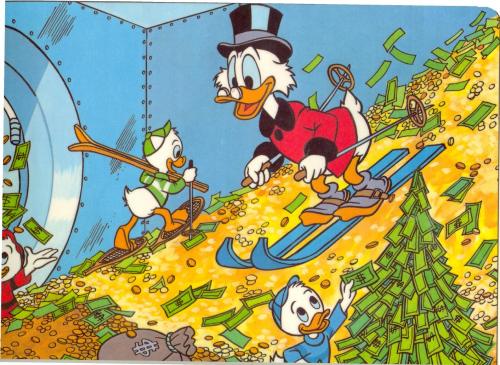Via John Aziz of Azizonomics blog,
What does it mean that China is making a lot of noise about the Federal Reserve’s loose monetary policy?
A senior Chinese official said on Friday that the United States should cut back on printing money to stimulate its economy if the world is to have confidence in the dollar.
Asked whether he was worried about the dollar, the chairman of China’s sovereign wealth fund, the China Investment Corporation, Jin Liqun, told the World Economic Forum in Davos: “I am a little bit worried.”
“There will be no winners in currency wars. But it is important for a central bank that the money goes to the right place,” Li said.
At first glance, this seems like pretty absurd stuff. Are we really expected to believe that China didn’t know that the Federal Reserve could just print up a shit-tonne of money for whatever reason it likes? Are we really expected to believe that China didn’t know that given a severe economic recession that Ben Bernanke would throw trillions and trillions of dollars new money at the problem? On the surface, it would seem like the Chinese government has shot itself in the foot by holding trillions and trillions of dollars and debt instruments denominated in a currency that can be easily depreciated. If they wanted hard assets, they should have bought hard assets.
As John Maynard Keynes famously said:
The old saying holds. Owe your banker £1000 and you are at his mercy; owe him £1 million and the position is reversed.
But I think Keynes is wrong. I don’t think China’s goal in the international currency game was ever to accumulate a Scrooge McDuck-style hoard of American currency. I think that that was a side-effect of their bigger Mercantilist geopolitical strategy. So China’s big pile of cash is not really the issue.
It is often said that China is a currency manipulator. But it is too often assumed that China’s sole goal in its currency operations is to create growth and employment for China’s huge population. There is a greater phenomenon — by becoming the key global manufacturing hub for a huge array of resources, components and finished goods, China has really rendered the rest of the world that dependent on the flow of goods out of China. If for any reason any nation decided to attack China, they would in effect be attacking themselves, as they would be cutting off the free flow of goods and components essential to the function of a modern economy. China as a global trade hub — now producing 20% of global manufacturing output, and having a monopoly in key resources and components — has become, in a way, too big to fail. This means that at least in the near future China has a lot of leverage.
So we must correct Keynes’ statement. Owe your banker £1000 and you are at his mercy; owe him £1 million and the position is reversed; owe him £1 trillion, and become dependent on his manufacturing output, and the position is reversed again.
The currency war, of course, started a long time ago, and the trajectory for the Asian economies and particularly China is now diversifying out of holding predominantly dollar-denominated assets. The BRICs and particularly China have gone to great length to set up the basis of a new reserve currency system.
But getting out of the old reserve currency system and setting up a new one is really a side story to China’s real goal, which appears to have always been that of becoming a global trade hub, and gaining a monopoly on critical resources and components.
Whether China can successfully consolidate its newfound power base, or whether the Chinese system will soon collapse due to overcentralisation and mismanagement remains to be seen.












